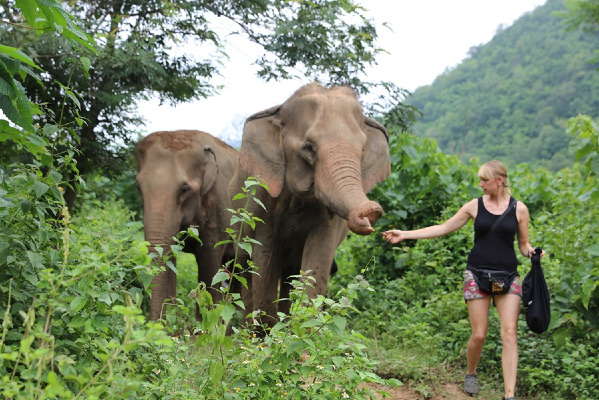
I love questions, really I do. Recently I was asked about ethical elephant experiences in Thailand, and although I do have my go to list, as I pondered the question, I realized that there is no simple answer. What does ethical mean? The dictionary definition states it is relating to moral principles or the branch of knowledge dealing with these. So first we must define what your moral principles are in order to determine what you believe is an ethical experience. Some experts argue that any ethical camp that is home to elephants will not allow elephant rides. Some point to scientific studies showing that this does not harm the animal and point to training practices as the most important standard. Some state elephants should never be chained. Others denounce breading programs and others tout it as a way to save this endangered species. So what is a self-respecting traveler to do?
The Asian Captive Elephant Working Group formed in 2015 by a group of elephant specialists, veterinarians, researchers, camp managers and conservationists to address the current situation for captive elephants in the tourism industry in Southeast Asia has stated some lofty goal however they have accomplished little in the way of hard rules and they to fail to dismiss the cultural aspect of mahouts working with elephants, and seem okay with chaining elephants , stating, “Chaining is an important part of managing elephants in a traditional hands-on system in Southeast Asia where there are no enclosures to contain the animals. The Global Federation of Animal Sanctuary takes a hard stance stating, “true sanctuaries never buy, sell, trade, breed, exploit, or profit from elephants. “ We believe the realities of the current environment in Thailand lie somewhere in between these competing philosophies.
Minimum Standards

The global standards for animals in tourism can be classified as the five freedoms.
- Freedom from Hunger and Thirst
- Freedom from Discomfort
- Freedom from Pain, Injury or Disease
- Freedom to Express Normal Behavior
- Freedom from Fear and Distress
Given the number of captive elephants in Asia, and the reduction of using elephants in logging, tourism is the number one place for captive elephants, and only viable option for some elephants. Elephant experiences in Thailand fall into one of two categories. The first is viewing elephants in their natural habitat; the second is viewing and/or interacting with elephants in zoos, sanctuaries, and elephant camps. Any elephant “show” should be avoided. Any form of trick performance is cruel as it is impossible to teach unnatural physical feats without violation most of the 5 basic rules. Some of the proclaimed sanctuaries offer a area that lies between the stark white of an altruistic sanctuary that let’s elephants be free with no human interaction and the black soul-crushing practice of Phajaan the traditional—and brutal—days- or weeks-long process of breaking a young elephant’s spirit. Under phajaan, elephants are bound with ropes, confined in tight wooden structures, starved, and beaten repeatedly with bullhooks, nails, and hammers until their will is crushed.” Finding the brightest of the gray gives tourism dollars a chance to benefit local workers, local farmers that grow food for elephants, and of course the elephants themselves.
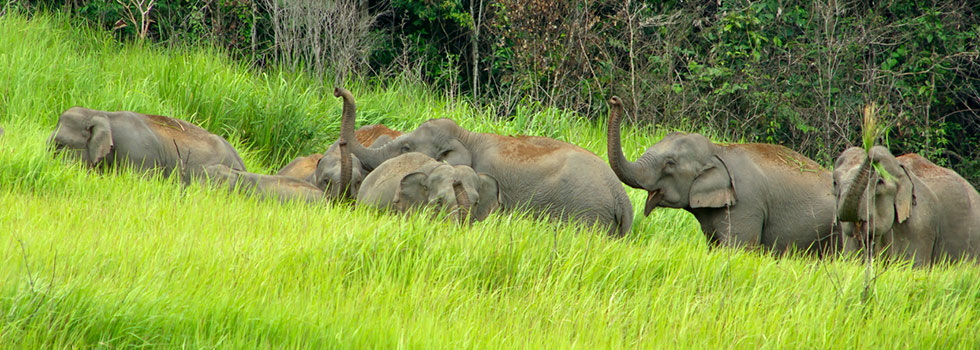
Wild Viewing
There are two very large national parks in Thailand which have been declared wildlife reserves. In central Thailand you have Khao Yai park, and in the south, Kui Buri park. Both contain a population of wild elephants who have never interacted with humans. At the parks you can view elephants in their natural habitat from a distance. There are no elephant interactions, you can not ride them, touch them, or bathe them, but then that’s the point. They are wild elephants living as elephants were meant to live. Interacting, social and free. There are even camping facilities at Kui Buri if you wanted to spend some time watching their behavior over a period of days.
To Ride, or Not To Ride
For a good read on the subject, we highly recommend https://www.cntraveler.com/story/is-it-ever-okay-to-ride-elephants-while-on-vacation. When Roberts states, ” The bigger question then becomes, How do you convey better practices without insulting a millennia-old culture? “Mahouts have been looking after elephants longer than Christianity and Islam have existed,” However, I personally take issue with the assertion that change should not occur because it is part of a long standing culture. This deeply flawed premise has been used to support deeply disturbing practices from the Taiji dolphin drive hunt where dolphins and other small cetaceans are driven a small bay where they are slaughtered or captured for sale to dolphinariums to the physical torture and mutilation of women. Slavery in the United States, and in fact throughout the world was part of culture, yet today we unanimously decry the idea that one person should own another, and castigate anyone that should suggest otherwise. I suspect that one day we will rise about the notion that culture can ever be used as an excuse to give a pass on actions that are clearly cruel in nature.
According to Dr Ingrid Suter, “Riding or bathing an elephant is a personal choice and is not compulsory to engage in if you do not wish to. But these activities can successfully be performed in a strict and measured way if a camp has high standards. Training an elephant need not be cruel, and is vital for making veterinary procedures safe to perform for both the elephant and veterinarians. Help elephants by patronizing camps that have a demonstrated high standard of elephant care. We agree.
Elephant Camps without Rides
Elephant Nature Park
This sanctuary acts as a ‘retirement home’ for rescued elephants. Elephant Nature Park is a unique project set in Chiang Mai province, Northern Thailand. Established in the 1990’s, an is not just for elephants, they are home to elephants, cats, dogs, buffaloes and many other rescued species.
Phuket Elephant sanctuary
The Phuket Elephant sanctuary is leading the way when it comes to the ethical treatment of retired/rescued elephants. Not only do elephants roam free but they also bathe freely too with the only tourist/elephant interaction allowed at feeding time. Please note that there are parks impersonating them in brochures so make sure you are being taken to the sanctuary in Paklok.
Friends of the Asian Elephant Hospital, Lampang
Not to be confused with the Thai Elephant Conservation Centre (also in Lampang) where elephants perform shows for tourists, this is the first elephant hospital of its kind in Thailand. The Friends of the Asian Elephant Hospital pioneers new methods and technologies to heal sick or wounded elephants and even has its own prosthetic center.
Elephant Hills, Khao Sok
One of the few completely chain free elephant parks in Southeast Asia. Elephant Hills is Thailand’s first Luxury Tented Jungle Camp, combining the camp idea of African national parks with the Thai tropical forest environment. The two camps, The Elephant Camp and the floating Rainforest Camp, are both situated in Khao Sok natural park, part of Southern Thailand’s largest stretch of primary Rainforest.
WFFT Thai Elephant Refuge, near Hua Hin
Wildlife Friends Foundation Trust takes an active stance against elephant exploitation. They offer a meet, greet and feeding experience with no bathing or riding etc.
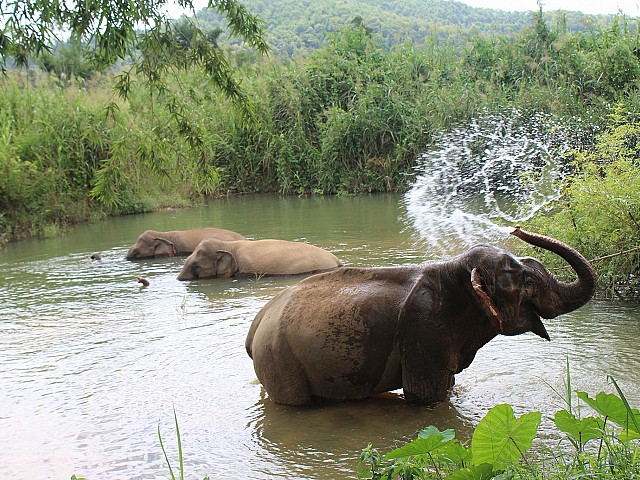
Boon Lott’s Elephant Sanctuary (BLES), Sukhothai
All profits from this sanctuary are reinvested into elephant conservation. Guest numbers are kept low and elephant welfare is put first.
BLES is located off-the-beaten track in the rural village of Baan Tuek in northern Thailand.It is situated on over 600 hundred acres of forested land that encourages the elephants to interact in a natural environment. Consisting of mature banana plantations, grasslands, open fields, fresh water rivers, and all types of fruit trees, BLES provides the elephants with a bounty of stimulation, exercise, and time to enjoy what is rightfully theirs. As an eco-friendly environment aiming toward self-sustainability, BLES has embarked on a program of tree planting. Not only does this vegetation provide elephants with their favorite foods, it also acts as shade to protect the elephants from the heat of the day.
This unique sanctuary is just that to the elephants— a haven that allows them to simply be. There are no rides, shows, or painting projects — just elephants who have finally been allowed to live with dignity and respect.
Elephant Valley, Chang Rai
Run by the people behind the award winning Elephant Valley Project in Cambodia, which adheres to strict ethical animal welfare standards. From the organic elephant food, the cheap and affordable fencing to the way they handle elephants is all orientated at putting the elephants best interests first. Key to this is an ethos that is driven by allowing the elephants to take the lead in their daily activities and therefore to lead a more natural life. Working towards giving the elephants back their independence, natural behavior and dignity is not easy and depends on the support and co-operation of our visitors. They don’t do many of the activities that you can find elsewhere (swimming, riding, cuddling and kissing elephants).
Anantara Golden Triangle Elephant Camp & Four Seasons
Perched on a ridge in northern Thailand overlooking the border with Myanmar and Laos, among the finest Chiang Rai hotels, Anantara Golden Triangle immerses you in once-in-a-lifetime experiences in luxury accommodations.
Elephant camps with Rides
While it is easy to find lots of places to ride elephants, it is much harder to find sanctuaries that meet the highest standards, we do give high marks to Thai Elephant Home.
Thai Elephant Home
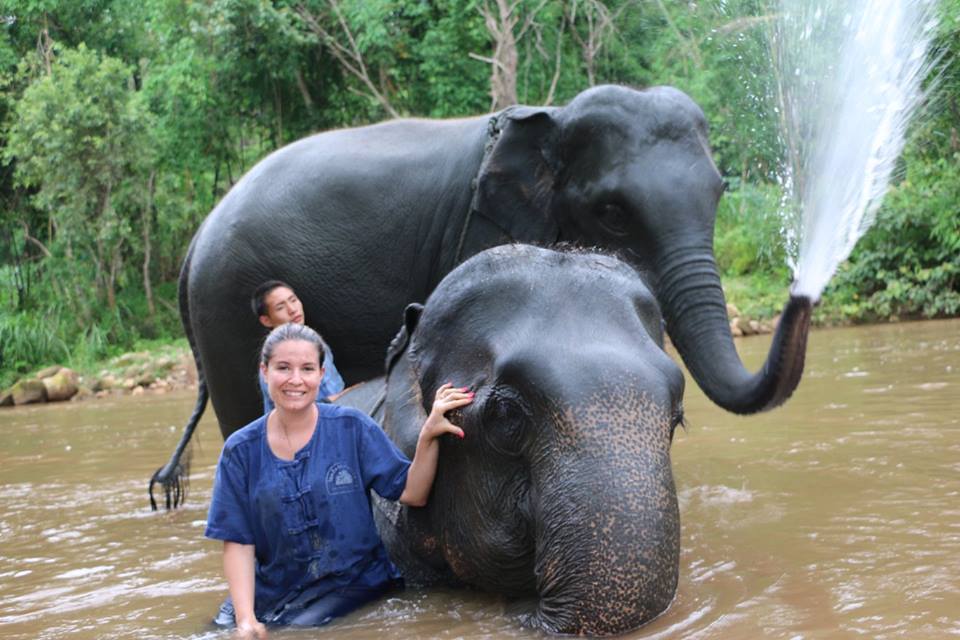
Thai Elephant Home realizes the number of Asian elephants continues to decline as the population pressures on the elephants’ natural habitat continues to increase. Thai Elephant Home has an active breeding program to increase the size of our herd therein helping to preserve the Asian elephant for future generations. Knowing the elephants’ natural jungle habitat is fragile and continues to decrease, Thai Elephant Home maintains trekking trails into the jungle which allow guests to enjoy nature without leaving a heavy footprint. Thai Elephant Home also has an active land purchasing program aimed at maintaining and expanding the elephants’ natural habitat.
Did you Know?
- An elephant will eat for up to 16 hours a day and has a constant need for water, accordingly an elephant should not work more than four hours a day and requires a significant break every hour.
- An elephant can easily suffer from sunstroke and should not be exposed to direct sunlight. Riding an elephant in the middle of the day should be avoided.
- An elephant’s maximum carrying capacity on his back must be limited should not carry more than two adults.
- Elephants are a “keystone species.” If a keystone species disappears through extinction or removal, the entire ecosystem would change drastically. Other species rely on the keystone species for survival.
- Elephants are highly social animals that form close bonds and family units.
So any camp or sanctuary that does not take the above facts into account when it comes to interaction, care and environment will fail the test of an ethical elephant camp or sanctuary. The biggest take away should be just because the name “sanctuary” is in the name, or a bright webpage declares that the elephants were “rescued” does not mean that you are supporting an ethical home to elephants. Because it is a Zoo or claims it is “not for profit” is also not a guarantee. You must do your homework. How much free time does the elephant have to interact with other elephants freely? Are they confined a large part of the day? Do they have access to veterinary care? What is the size of the sanctuary? Where do the elephants come from? How do they train the elephants? As with life, in travel, “First Do No Harm” are golden words that give you a roadmap into where you should spend your time and hard earned vacation dollars. Travel should make you free, engage your senses, expand your mind and leave your concise morally intact.
It isn’t always easy. I took a tour at a zoo in Bali, and my own elephant experience left me feeling nothing but sad. I assumed a zoo would have the welfare of the animal before profit, but the size of the living conditions were clearly not in the elephants best interests. As I looked into the brimming intelligent eyes, I saw another soul look back at me, and I wept.
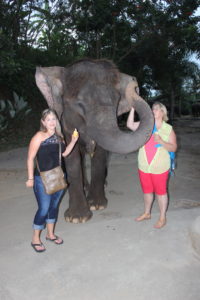
Midwest Travel Solutions is here to help you by crafting vacations and milestone journeys to the most interesting travel destinations in the world, all with an eye to the ethics of travel.
